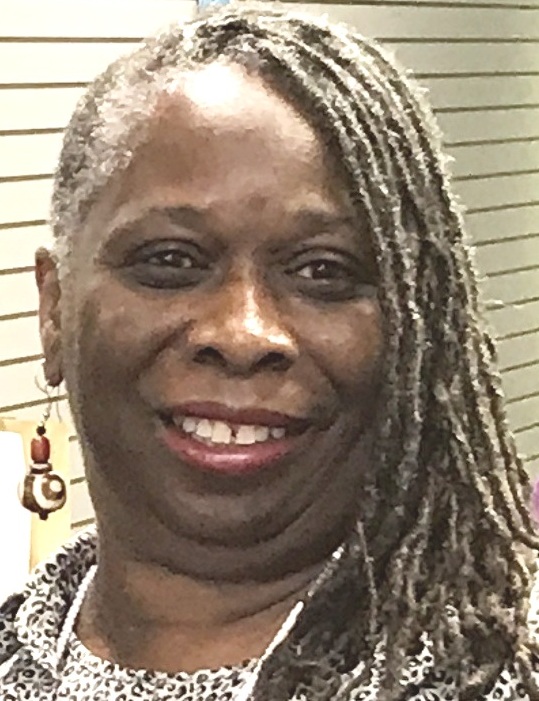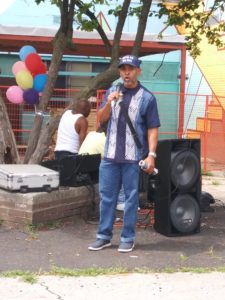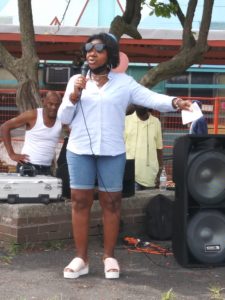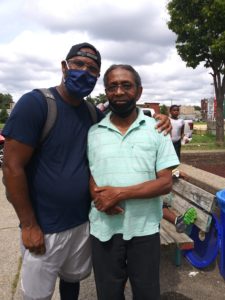Neighborhoods in North Philly focus on violence — causes and solutions
 August 31, 2021
Category: Featured, Long, Purpose
August 31, 2021
Category: Featured, Long, Purpose
Social unrest and violence has increased worldwide during the past two years.
Violent crime increasingly plagues cities and suburbs around the US. Add into that mix: a pandemic that shut the nation down for a year, people losing jobs, income and loved ones to coronavirus, increased poverty and food insecurity, disruption of education, suffering from depression, fear of what the future holds and a big dose of overt racism like back in the 1950s. As a result, people, communities and cities will explode with extreme, negative expressions of their frustration and hopelessness.
Violence in the US is now a health emergency that’s infecting and affecting individuals, families and communities nationwide — just like coronavirus.
A recent study from the Council on Criminal Justice (CCJ), conducted by CCJ Research Specialist Ernesto Lopez and Criminology Professor Emeritus Richard Rosenfeld, examines monthly crime rates in 29 US cities including Philadelphia. The CCJ is a nonpartisan, independent, membership organization and think tank, “founded on the belief that a fair and effective criminal justice system is essential to democracy.”
According to the study, nationally:
“[T]he number of homicides increased by 16% during the first half of 2021 — 259 more homicides — compared to the same period the year before, and by 42% — claiming an additional 548 additional lives — compared to the same time frame in 2019. The aggravated assault rate was 9% higher in the first half of 2021, and the gun assault rate was 5% higher in the first half of 2021. Motor vehicle theft rates were 21% higher in the first half of 2021 than the year before.”
So, what’s the cause of the increased violence and what do we do about it?
The authors of the CCJ study concluded that, “As the pandemic subsides, long-lasting reductions in violence and crime will require pursuing evidence-based crime-control strategies and enacting long-needed reforms to policing.”
Organizations like Common Justice that take a more holistic approach to decreasing violence in the community say: “Community is what keeps us safe, not prisons.” The New York-based nonprofit works to advance solutions to violence without relying on incarceration.
In Philadelphia, Common Justice works in partnership with Ubuntu Philadelphia, an organization that provides communities with the opportunity to change the culture and environment of their communities from violence and victimization to peaceful, safe and caring communities. The CHARLES Foundation, founded in 2011 by Movita Johnson Harrell after the murder of her son, is the other Philly partner. The foundation provides advocacy for and assists children with building self-esteem and conflict resolution skills.
Increasing violence in North Philadelphia neighborhoods
Homicides in Southeastern Pennsylvania have reached epidemic proportions with communities in North Philadelphia becoming the epicenter, having suffered through an alarming increase of gun violence over the past two years.
That’s why the 32nd Democratic Ward recently held a community rally at the Martin Luther King, Jr. Recreation Center on Cecil B. Moore Avenue to discuss the violence and quality of life in their neighborhoods.
Organizers felt the need to discuss and understand why so much chaos is occurring in their communities, and how to remedy the problem.
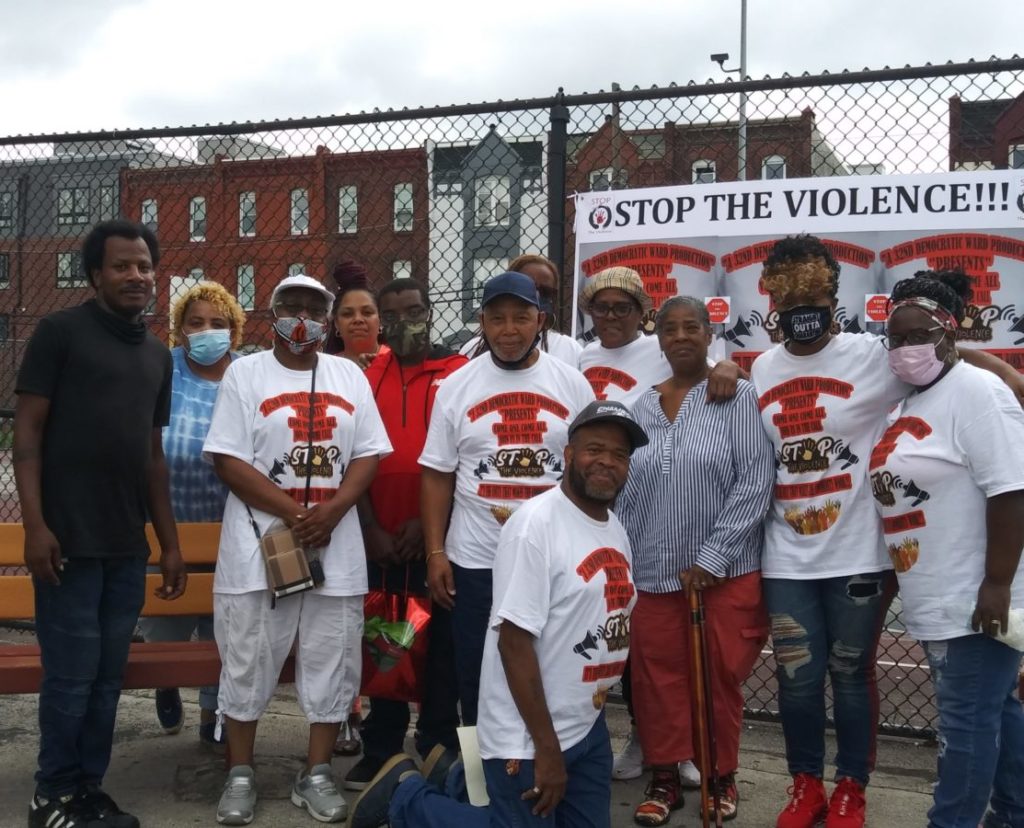
32nd Ward Chair Darnell Deans Sr. with the ward’s committee people at the rally. (Photo by Marilyn Kai Jewett)
“We decided it’s important to bring together people and organizations who share our concerns about the quality of life on our blocks and in our neighborhoods,” said 32nd Ward Chair Darnell Deans, Sr. one of the organizers. “The focus is on what’s happening in our neighborhoods concerning persistent gun violence and identifying resources needed to specifically strengthen families in the 32nd Ward and neighboring communities in the 47th and 16th Wards.”
“We also want to get the word out about the importance of voting,” Deans added, “how it affects our daily lives and how to use our voting power to effect realistic political change. Informed and engaged residents can unify the community in numerous ways.”
Speakers included representatives from organizations like Philadelphia CeaseFire, Community Behavioral Health, the 47th and 16th Democratic Wards, and others working in the community.
Kempis Songster, aka Ghani, founder of Ubuntu Philadelphia, was the featured speaker.
An ex juvenile offender who spent 30+ years in prison sentenced to life without parole before being released, Ghani is program manager of Restorative Justice Diversion for the Youth Art & Self-Empowerment Project.
Ghani and others spoke of the root causes of the violence.
“The violence is the result of the problem,” Ghani said. “Violence is what results when you see no escape from suffering. The behavior we see from our young people is their response to the problem. Our young people are wading through socially-toxic environments, concrete jungles, defunded schools, poverty, domestic abuse in their households, and drugs proliferating in their communities. Our children are growing up in environments that are traumatizing them. Can you imagine growing up in Kensington?”
Community activist Gail Loney, a mother and block captain in the 16th Ward, expressed frustration with the lack of opportunities and positive outlets for neighborhood youth in North Philly.
“The young people have no place to go, no structured programs, they can’t get jobs and the education is lacking,” she said. “Some of them can’t read and can’t do math. The youth who made through the educational system have no jobs. A $7.25 minimum wage? How can you take care of your family or yourself on $7.25 an hour?”
“We are oppressed and people are depressed,” Loney added. “They are mentally-challenged on all types of levels and that leads to violence. When people are harmed, they harm others. Our children deserve better and when you don’t take care of them, they don’t think they are loved. They don’t think they are important and go out and do all kinds of things to get attention.”
Community members outline solutions
Ghani thinks one of the ways to combat the violence and dysfunction in many communities is for the adults and elders to reclaim their historical status. Those who point an accusing finger at the youth must look in the mirror.
“There was a time in our communities when the culture was passed down from one generation to the next,” he said. “We got our knowledge from our mothers and fathers.”
He said culture and knowledge is now is passed and transmitted to children from peer to peer, and it’s time for parents and elders to stop trying to be young people’s peers and instead be role models.
“You are the mother and father, the grandmother. Make sure they see that distinction,” Ghani continued. “We can circle the wagons around our children and help them. Teach them conflict resolution and how to resolve differences with each other. They might listen to half of what we say, but they do all of what they see us do.”
Loney thinks dirty communities negatively affects people’s mental attitude about where they live. She regularly organizes clean-up activities on her block, feels that clean, beautified neighborhoods will help address the quality of life — and urged city officials to stop developers from using North Philadelphia as a dump for their construction waste.
She also thinks improved education, career training and family-sustaining jobs can help reduce violence.
“Our young people need jobs that can pay at least $20 an hour,” Loney said. “I don’t see anyone making $20 an hour sticking people up. There are jobs you can get making $20 an hour with a certificate of training. We need to come together as a community and work as one unit to clean-up and stabilize our neighborhoods.”
Tito Cobbs, the youth coordinator at MLK, Jr. Recreation Center who works with the North Philly Buccs football and cheer teams, went to straight to what some see as the heart of the problem. He said he works with youth because he felt obligated as a man to return what was done for him as a youth growing up in North Philadelphia. He was accompanied at the rally by Rufus Briley, his preschool Head Start teacher at Duckery Elementary School.
“We need men to step up,” Cobbs said. “We need fathers to step up. Our mothers and grandmothers have been carrying the weight of our communities. We now have to take responsibility for what’s happening in our communities. As Black and Hispanic men we have to take responsibility for our families and our children. If you have daughters and sons, you need to be involved in your children’s lives.”
Cobbs said many of the youth he mentors don’t feel loved and have never experienced the love of a father or male role model. He said many youth don’t know what it means to be loved or how to love others.
He is trying to break the cycle by showing them that “it’s okay to be nourished by a man.” Cobbs is dedicated to showing the youth that regardless of economic status or educational level, “I love them and I will continue to love them to the point that I see them progressing and become successful in life.”
The question of investment
More attention is now on socioeconomic investments in communities impacted by gun violence and community-led plans to address violence, while politicians make speeches about violence prevention.
President Biden has pledged to invest $5 billion over eight years in community violence prevention.
But some North Philly residents I spoke to wondered whether that money will be spent on initiatives that support an updated educational infrastructure and career- and entrepreneurial-training that results in family-sustaining incomes — or if the investment will be funneled to the usual, self-serving suspects.
Only time will tell.
Trending News







